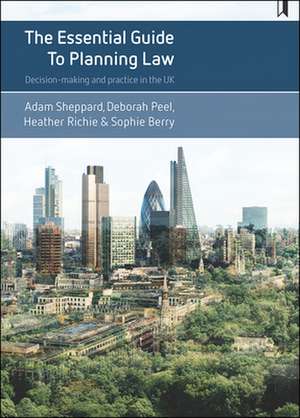The Essential Guide to Planning Law: Decision-Making and Practice in the UK
Autor Adam Sheppard, Deborah Peel, Heather Ritchie, Sophie Berryen Limba Engleză Paperback – 14 feb 2017
This textbook is designed to give students all the background and contextual information they will need to understand the regulatory structures that enable public and urban planning in the United Kingdom. Aimed at beginning students with little to no previous knowledge of law or planning, it enables them to understand the intersections of law and planning and more deeply engage with either subject.
| Toate formatele și edițiile | Preț | Express |
|---|---|---|
| Paperback (1) | 285.59 lei 3-5 săpt. | |
| Bristol University Press – 14 feb 2017 | 285.59 lei 3-5 săpt. | |
| Hardback (1) | 734.79 lei 6-8 săpt. | |
| Bristol University Press – 14 feb 2017 | 734.79 lei 6-8 săpt. |
Preț: 285.59 lei
Nou
Puncte Express: 428
Preț estimativ în valută:
54.66€ • 56.58$ • 46.20£
54.66€ • 56.58$ • 46.20£
Carte disponibilă
Livrare economică 13-27 februarie
Preluare comenzi: 021 569.72.76
Specificații
ISBN-13: 9781447324461
ISBN-10: 1447324463
Pagini: 224
Dimensiuni: 171 x 241 x 15 mm
Greutate: 0.43 kg
Editura: Bristol University Press
Colecția Policy Press
ISBN-10: 1447324463
Pagini: 224
Dimensiuni: 171 x 241 x 15 mm
Greutate: 0.43 kg
Editura: Bristol University Press
Colecția Policy Press
Notă biografică
Adam Sheppard is a senior lecturer in the Department of Geography and Environmental Management at the University of the West of England.Deborah Peel is chair in architecture and planning at the University of Dundee. Heather Ritchie is a lecturer in spatial planning and energy policy at the School of the Built Environment at the University of Ulster, Northern Ireland. Sophie Berry is a senior planning officer for the Newport City Council.
Cuprins
Preface
Part One: Planning Law
Planning law in context
Development of statutory land use planning in the UK
Planning arrangements in the devolved UK
Reform and modernisation of the UK's planning systems
Core principles and concepts of planning law
Part Two: Plans, Decision-making and Practice
Development Plans: Forward planning and planning policy
Development Management: Permissions, applications and permitted development
Planning conditions, agreements, and obligations
Other forms of planning control and consent
Part Three: Rights, Challenges and Professional Responsibilities
Enforcement
Planning Appeals, Judicial Review and the Ombudsman
Planning in Practice: Decision-making with others
Part One: Planning Law
Planning law in context
Development of statutory land use planning in the UK
Planning arrangements in the devolved UK
Reform and modernisation of the UK's planning systems
Core principles and concepts of planning law
Part Two: Plans, Decision-making and Practice
Development Plans: Forward planning and planning policy
Development Management: Permissions, applications and permitted development
Planning conditions, agreements, and obligations
Other forms of planning control and consent
Part Three: Rights, Challenges and Professional Responsibilities
Enforcement
Planning Appeals, Judicial Review and the Ombudsman
Planning in Practice: Decision-making with others
Recenzii
“An easily accessible way into the planning worlds of our UK nations for someone who is just starting their career in planning. Reasonably compact but also comprehensive, it provides an overview of planning law and practice with an obvious link to the real world. Money worth spending.”
“Sheppard and colleagues have produced an extremely accessible ‘planning book that considers planning law and its application.’ Written specifically for students on a variety of built environment courses, this text provides an ideal introduction to the statutory basis of planning practice and decision making whilst unraveling the distinctive legal and policy arrangements that now characterize the devolved parts of the United Kingdom.”
“Planning students—and others—can sometimes find it difficult to engage with law texts on planning.The Essential Guide to Planning Law speaks directly to planning students in a clear and concise way, giving them the confidence to engage with more complex legal material. The text also demonstrates experience and insight into what graduate planners need to know about planning, law, and practice.”








